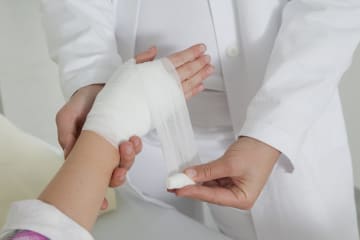
Your Child's Recovery
Your doctor removed dead or unhealthy tissue (debridement) from your child's wound. How it was done depends on how severe the wound was.
Your child may have some pain and swelling around the wound. This should get better within a few days. Your child may have a bandage or a moist dressing over the wound. The doctor will let you know how long to keep it on and how often to change it.
How long it will take for your child's wound to heal depends on how serious the wound is and whether your child has any other health problems that may slow healing. Your child may need to have the wound debrided again.
This care sheet gives you a general idea about how long it will take for your child to recover. But each child recovers at a different pace. Follow the steps below to help your child get better as quickly as possible.
How can you care for your child at home?
 Activity
Activity
- Help your child rest when your child feels tired. Getting enough sleep will help your child recover.
- Help your child avoid activities that put stress on the wound, until your doctor says it's okay.
- Encourage your child to change positions often to keep pressure off the wound. Spread your child's body weight evenly with cushions, mattresses, foam wedges, or other pressure-relieving devices.
- If the wound is on your child's leg or foot, your child may have to use crutches, a supportive boot, or a fitted shoe to keep pressure off the wound. If your child needs crutches, it may help to use a backpack or wear clothes with lots of pockets to carry things.
- Do not let your child shower for at least 24 hours after the procedure or for as long as your doctor says to wait. When your child showers, help your child keep the dressing and wound dry.
- Do not let your child take a bath, swim, use a hot tub, or soak the area until your doctor says it's okay.
 Diet
Diet
- Your child can eat a normal diet. If your child's stomach is upset, try bland, low-fat foods like plain rice, broiled chicken, toast, and yogurt.
- Help your child eat a well-balanced diet with enough protein to help the wound heal. Protein is a key nutrient in helping to repair damaged tissue and promote new tissue growth. Good sources of protein are milk, yogurt, cheese, meat, and beans.
 Medicines
Medicines
- Your doctor will tell you if and when your child can restart any medicines. The doctor will also give you instructions about your child taking any new medicines.
- Be safe with medicines. Read and follow all instructions on the label.
- If the doctor gave your child a prescription medicine for pain, give it as prescribed.
- If your child is not taking a prescription pain medicine, ask your doctor if your child can take an over-the-counter medicine.
- If your doctor prescribed antibiotics for your child, give them as directed. Do not stop using them just because your child feels better. Your child needs to take the full course of antibiotics.
- If your doctor prescribed an antibiotic ointment to put on the wound, use it as directed.
 Incision care
Incision care
- A moist dressing may cover your child's wound. A dressing helps the wound heal and protects it. Your doctor will tell you how to take care of this.
- If your child had a skin graft, your child may have a bandage over the graft. The doctor will remove the bandage and stitches.
Follow-up care is a key part of your child's treatment and safety. Be sure to make and go to all appointments, and call your doctor if your child is having problems. It's also a good idea to know your child's test results and keep a list of the medicines your child takes.
When should you call for help?
Call your doctor now or seek immediate medical care if:
- Your child has pain that does not get better after taking pain medicine.
- Your child has symptoms of infection, such as:
- Increased pain, swelling, warmth, or redness.
- Red streaks leading from the wound.
- Pus draining from the wound.
- A fever.
- The wound starts to bleed, and blood soaks through the bandage. Oozing small amounts of blood is normal.
- Your child has loose stitches, or the skin graft comes loose.
Watch closely for any changes in your child's health, and be sure to contact your doctor if:
- The wound is not getting better as expected.
Current as of: December 4, 2024
Author: Ignite Healthwise, LLC Staff
Clinical Review Board
All Ignite Healthwise, LLC education is reviewed by a team that includes physicians, nurses, advanced practitioners, registered dieticians, and other healthcare professionals.

